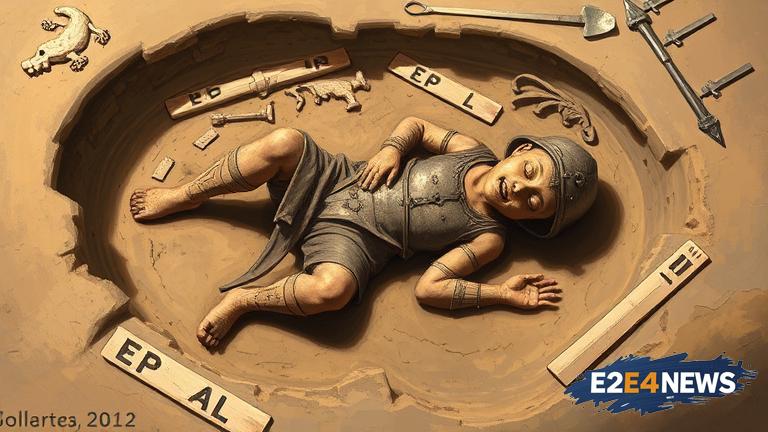A recent archaeological excavation in the Iberian Peninsula has led to the discovery of a rare infant burial site, dating back to the Roman military era. The finding has significant implications for our understanding of the lives of Roman military families and their burial practices. The excavation, which took place in a region that was once a major Roman military outpost, uncovered the remains of an infant, estimated to be around 6-12 months old at the time of death. The infant was buried in a small, ceramic vessel, which was placed in a larger grave, likely belonging to a Roman soldier. The discovery has sparked interest among historians and archaeologists, who are eager to learn more about the lives of Roman military families and their experiences in the Iberian Peninsula. The Roman military presence in the region dates back to the 2nd century BC, and it is believed that many soldiers brought their families with them to the region. However, very little is known about the daily lives of these families, and the discovery of the infant burial site provides a unique glimpse into their experiences. The excavation also uncovered a number of artifacts, including coins, jewelry, and other personal items, which provide valuable insights into the lives of the Roman military families. The discovery of the infant burial site has also raised questions about the social and cultural norms of the Roman military families, and how they dealt with the death of a child. In ancient Roman culture, the death of a child was often seen as a tragic event, and it is likely that the family of the infant would have performed certain rituals and ceremonies to honor their memory. The excavation has also highlighted the importance of the Iberian Peninsula as a major center of Roman military activity, and the significant role that the region played in the expansion of the Roman Empire. The discovery of the infant burial site is a significant find, not only because of its rarity but also because of the insights it provides into the lives of Roman military families. The excavation has been carried out by a team of archaeologists from a local university, who have been working in the region for several years. The team has been using a range of techniques, including excavation, surveying, and analysis of artifacts, to learn more about the lives of the Roman military families. The discovery of the infant burial site is just one of several significant finds that the team has made in the region, and it is likely that further excavations will uncover even more insights into the lives of the Roman military families. The Iberian Peninsula was an important region for the Roman military, and it is believed that many soldiers were stationed in the region for extended periods of time. The region was also an important center for trade and commerce, and it is likely that the Roman military families would have had access to a range of goods and services. The discovery of the infant burial site has also highlighted the importance of preserving our cultural heritage, and the need to protect archaeological sites from damage and destruction. The excavation has been supported by a range of organizations, including local government agencies and historical societies, and it is likely that further funding will be made available to support future excavations. The discovery of the infant burial site is a significant find, and it is likely that it will be the subject of further research and study in the coming years. The excavation has also highlighted the importance of interdisciplinary research, and the need for archaeologists, historians, and other experts to work together to learn more about the past. The discovery of the infant burial site is a reminder that there is still much to be learned about the lives of Roman military families, and that further research and excavation are needed to uncover the secrets of the past.
